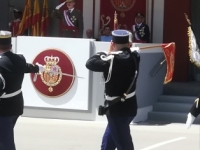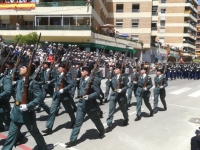Politics
Spain celebrates the Day of its Armed Forces suspended for the last two years
Ukraine and NATO lead the celebration
USPA NEWS -
Spain celebrated this Saturday, May 28, the Day of its Armed Forces, a day that ended a week of rapprochement between the armies and society. On this occasion, the city of Huesca (54,083 inhabitants, bordering France), which was overturned with soldiers and, above all, with King Felipe VI and Letizia, who presided over the military parade this Saturday. It was the third time that the celebration of the Day of the Armed Forces was announced in Huesca, after it was suspended in 2020 and 2021 due to the Coronavirus pandemic, and this time, finally, it could be celebrated.
The inhabitants of Huesca, a city that has its roots in the Neolithic and owes its name to Roman culture, took to the streets, packing the streets where the parade passed but also the balconies throughout the route. Flags of Spain hung from the balconies and many people carried flags that they waved as the soldiers passed and when the Kings arrived. It was at noon when the monarchs arrived at the tribune from where they presided over the military parade. They were previously received by the president of the regional government of Aragon, Francisco Javier Lambán; the Minister of Defense, Margarita Robles; and the chief of the Defense Staff, Admiral General Teodoro López Calderón, among other authorities. Also present were the Minister of the Home Affairs, Fernando Grande-Marlaska; the Secretary of State for Defense, Amparo Valcarce, and the Secretary of State-director of the National Intelligence Center (CNI in its acronym in Spanish), Esperanza Casteleiro.
This Saturday's parade was the first to be celebrated with a war in Europe. Ukraine was present in the memory of those attending the parade. Before the arrival of the King and Queen, the Minister of Defense, in statements to Spanish public television, announced the forthcoming shipment to Latvia of six anti-aircraft missiles and a hundred soldiers who will reinforce the security of NATO's eastern flank. This year Spain celebrates the 40th anniversary of its accession to the Atlantic Alliance and this was the theme of the week of military celebration.
A team from the Air Force Parachute Acrobatic Patrol (PAPEA) parachuted down carrying a large Spanish flag, which was hoisted in front of the Kings' stand and under which the tribute to the fallen was celebrated. King Felipe VI placed a laurel wreath at the foot of the mast of the national flag, in memory of all the soldiers who, throughout history, gave their lives for Spain.
45 planes and 24 helicopters participated in the parade this Saturday; 17 armored-mechanized vehicles, 97 vehicles and 40 motorcycles; and 3,279 soldiers belonging to 58 units deployed throughout the country. Among them, Eurofighter planes that have participated in international Air Police missions in the Baltic on three occasions: in Estonia in 2015, in Lithuania in 2018 and in the Black Sea in 2021; the F-18 Hornet that, between 1995 and 2002, participated in the pacification of the former Yugoslavia, with the Deliberate Force (1995) and Allied Force (1999) of real attack missions over Bosnia-Herzegovina, Kosovo and Yugoslavia; and the Aspa Patrol, unique in the world, with five helicopters, which in 2008 participated in the Althea operation in the former Yugoslavia. Spanish helicopters from the Army Airmobile Forces (FAMET in its acronym in Spanish) have participated in international missions over the last 30 years in Croatia, Bosnia, Albania, Mozambique, Kosovo, Kyrgyzstan, Lebanon and Afghanistan.
Among the land units that paraded in Huesca, one of the most applauded was the Legion. Created in 1920, it was conceived as a vanguard force in the Moroccan war. Considered throughout the world as one of the most prestigious military units, the Spanish Legion was the first to be used in operations abroad under the United Nations flag. It began in 1992 in Bosnia-Herzegovina, but has also been deployed in Albania, Kosovo, Macedonia, Iraq – on two occasions -, Congo, Lebanon, Afghanistan and Mali. A company of French gendarmes also participated, collaborating with the Spanish Police and Civil Guard in security on both sides of the common border.
After the parade, the King and Queen of Spain traveled to Paris to attend the Euro Cup final between Liverpool and Real Madrid at the Stade of France in Saint Denis. The monarchs thus wanted to show their support for the Spanish team, the most successful in continental competition. The game started late when a security flaw in the stadium was detected.
Liability for this article lies with the author, who also holds the copyright. Editorial content from USPA may be quoted on other websites as long as the quote comprises no more than 5% of the entire text, is marked as such and the source is named (via hyperlink).







